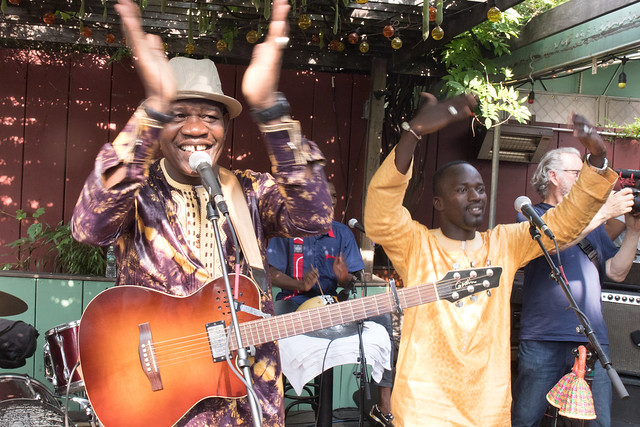Blick Bassy is a Cameroonian-born, French-based singer/songwriter, who released a number of award-winning albums with his backing band Macase, which culminated with the release of 2015’s Akö, an album that included “Kiki,” a track that was used to launch the iPhone 6. Bassy’s forthcoming album La Cigale is his first album in over four years, and it will be released through Nø Førmat Records.
La Cigale’s first single is the atmospheric and mournful “Ngwa,” which translates into English as “my friend.” Centered by a gorgeous horn arrangement, glitchy electronics and Bassy’s achingly tender vocals, singing in his ancestral Bassa language, the track sounds as though it were inspired by Peter Gabriel and Rubblebucket; but it evokes both a sense of profound and inconsolable loss and a mournful sense of missed opportunity from that loss that wonders “what could have happened if . . .?” The song is Bassy’s tribute to the heroes who fought and died for the independence of Bassy’s native Cameroon — in particular, Ruben Um Nyobe, the anti-colonialist leader of the Popular Union of Cameroon (UPC), who was murdered by French troops on September 13, 1958, just two years before the country became independent. Speaking of what drove him to write the song, Bassy says “Ngwa, I wanted to pay tribute to your fight, our fight, but also to your philosophy, where the values of equality, antiracism, anti xenophobia, serve emancipation and fulfilment for every human being.”
The UPC had been campaigning for independence for fifteen years, during which many people died — facts that had been subtly erased from the country’s history books by the French and Cameroon until recently. Bassy wants to shed light on Um Nyobe’s story, saying in press notes, “In school we studied the French version of what happened. The way I learned it in the books was that they were agitators, troublemakers. Which is wrong. Um Nyobé was in this movement hidden in the mountains, organising the Cameroonian People’s Union, and the truth about what happened has never been out.”
Directed by up-and-coming South African director Tebogo Malope, the incredibly cinematic visuals for “Ngwa” was shot in Lesotho, and is a slow-burning meditation on the relationship between present-day Cameroon and its former French colonizers with Bassy embodying the spirit of Um Nyobe and the Cameroonian people.
Speaking about the video – across which Bassy’s character is hunted down by French soldiers Malope says, “The narrative of Ruben Um Nyobé is one that resonates throughout the continent, one that is still grappling with the legacy of colonialism and attempts to redress the consequences thereof. This is echoed in the video’s initial scenes which reference renowned Kenyan renowned Author Ngugi Wa Thiongo’s book Matigari, where a freedom fighter lays down his arms for a supposed prosperous future where bloodshed shall be no more. Will he regret the decision? Another representation at the video’s end spawns from the images of a lifeless freedom fighter turning into a tree, reminiscent of South African political icon Solomon Mahlangu, who was killed by the Apartheid government. His last words before his death were ‘My blood will nourish the tree that will bear the fruits of freedom.'”

